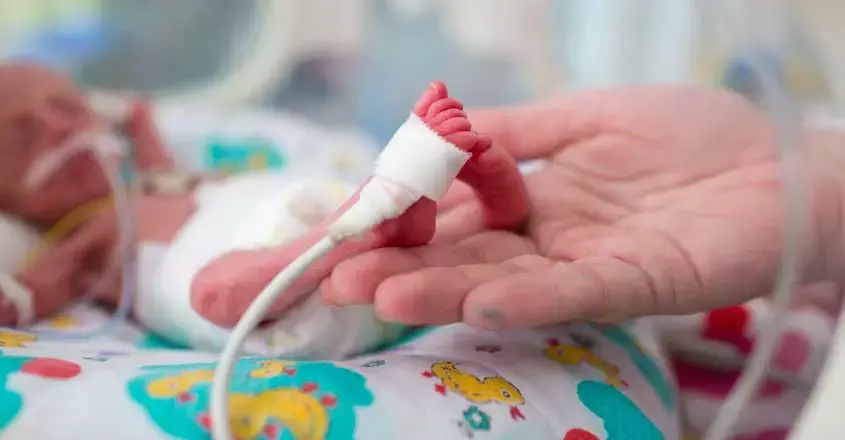- Home
- Medical news & Guidelines
- Anesthesiology
- Cardiology and CTVS
- Critical Care
- Dentistry
- Dermatology
- Diabetes and Endocrinology
- ENT
- Gastroenterology
- Medicine
- Nephrology
- Neurology
- Obstretics-Gynaecology
- Oncology
- Ophthalmology
- Orthopaedics
- Pediatrics-Neonatology
- Psychiatry
- Pulmonology
- Radiology
- Surgery
- Urology
- Laboratory Medicine
- Diet
- Nursing
- Paramedical
- Physiotherapy
- Health news
- Fact Check
- Bone Health Fact Check
- Brain Health Fact Check
- Cancer Related Fact Check
- Child Care Fact Check
- Dental and oral health fact check
- Diabetes and metabolic health fact check
- Diet and Nutrition Fact Check
- Eye and ENT Care Fact Check
- Fitness fact check
- Gut health fact check
- Heart health fact check
- Kidney health fact check
- Medical education fact check
- Men's health fact check
- Respiratory fact check
- Skin and hair care fact check
- Vaccine and Immunization fact check
- Women's health fact check
- AYUSH
- State News
- Andaman and Nicobar Islands
- Andhra Pradesh
- Arunachal Pradesh
- Assam
- Bihar
- Chandigarh
- Chattisgarh
- Dadra and Nagar Haveli
- Daman and Diu
- Delhi
- Goa
- Gujarat
- Haryana
- Himachal Pradesh
- Jammu & Kashmir
- Jharkhand
- Karnataka
- Kerala
- Ladakh
- Lakshadweep
- Madhya Pradesh
- Maharashtra
- Manipur
- Meghalaya
- Mizoram
- Nagaland
- Odisha
- Puducherry
- Punjab
- Rajasthan
- Sikkim
- Tamil Nadu
- Telangana
- Tripura
- Uttar Pradesh
- Uttrakhand
- West Bengal
- Medical Education
- Industry
High Carboxyhaemoglobin Levels in Preterm Infant Linked to Bronchopulmonary dysplasia and IVH

Oxidative stress is postulated to play a significant role in the development of free-radical-related diseases in prematurely born infants. Carboxyhaemoglobin (COHb) levels may reflect the level of early oxidative stress which plays a role in mediating free-radical-related diseases in prematurely born infants. A recent study suggests that high COHb levels in prematurely born infants were associated with the development of Bronchopulmonary dysplasia (BPD) and intraventricular haemorrhage (IVH). The study findings were published in the Early Human Development on January 2022 Issue.
A potential marker of oxidative stress in the neonatal population is carboxyhaemoglobin (COHb). Despite being readily available with potential clinical utility, COHb levels are currently not routinely considered in the clinical assessment and monitoring of disease progression in prematurely born infants. Also, studies assessing the relationship of COHb to BPD and other free-radical-related diseases are limited. Therefore, Dr Theodore Dassios and his team conducted a study to assess the relationship of COHb levels in the first seven days of birth to the development of BPD and other free-radical-related diseases.
In a retrospective analysis, the researchers included 104 infants born at less than 30 weeks of gestation and routinely performed COHb via blood gas samples. The major outcome assessed was maximum COHb per infant per day recorded for the first 28 days and BPD and other free-radical-related diseases including intraventricular haemorrhage (IVH). They also recorded the severity of BPD, requirement for home oxygen on discharge and survival to discharge.
Key findings of the study:
- Upon analysis, the researchers found that infants who developed BPD (n = 76) had significantly higher COHb levels in the first seven days [1.7% ] compared to those that did not develop BPD [1.6%].
- They also found higher COHb levels in the first seven days after birth in infants with grade three/four IVH [n = 20; 1.9%] compared to those without [1.6%].
- However, they noted that the COHb levels were not associated with the duration of ventilation, BPD severity or survival to discharge.
The authors concluded, "Raised COHb levels may act as an early warning sign, allowing clinicians to differentiate prematurely born infants at greater the risk of developing a free-radical-related disease, in particular BPD and IVH. This may allow identification of prematurely born infants who could benefit from novel antioxidant therapies to potentially mitigate the harmful consequences of oxidative stress."
They further added, " As an existing resource, COHb levels could also offer a cost-effective method of enhancing routine care provided to prematurely born infants admitted to the neonatal unit."
For further information:
DOI: https://doi.org/10.1016/j.earlhumdev.2021.105523
Medical Dialogues Bureau consists of a team of passionate medical/scientific writers, led by doctors and healthcare researchers. Our team efforts to bring you updated and timely news about the important happenings of the medical and healthcare sector. Our editorial team can be reached at editorial@medicaldialogues.in.
Dr Kamal Kant Kohli-MBBS, DTCD- a chest specialist with more than 30 years of practice and a flair for writing clinical articles, Dr Kamal Kant Kohli joined Medical Dialogues as a Chief Editor of Medical News. Besides writing articles, as an editor, he proofreads and verifies all the medical content published on Medical Dialogues including those coming from journals, studies,medical conferences,guidelines etc. Email: drkohli@medicaldialogues.in. Contact no. 011-43720751


